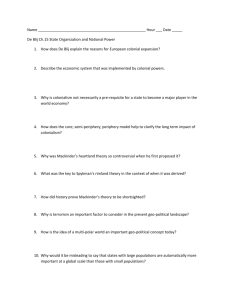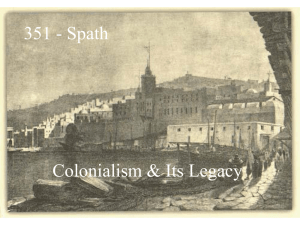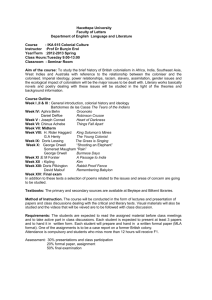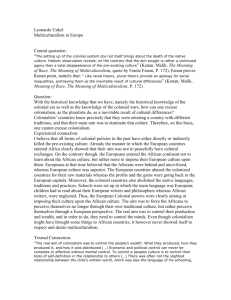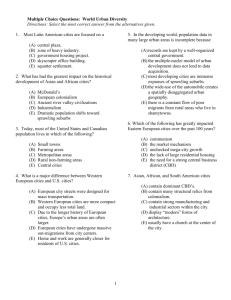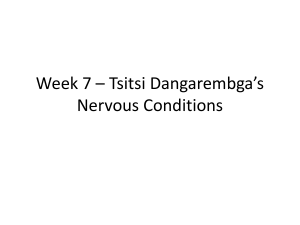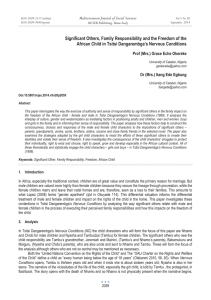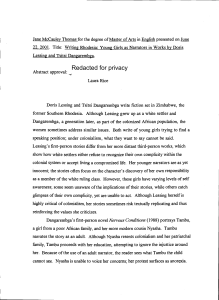Tsitsi Dangarembga
advertisement
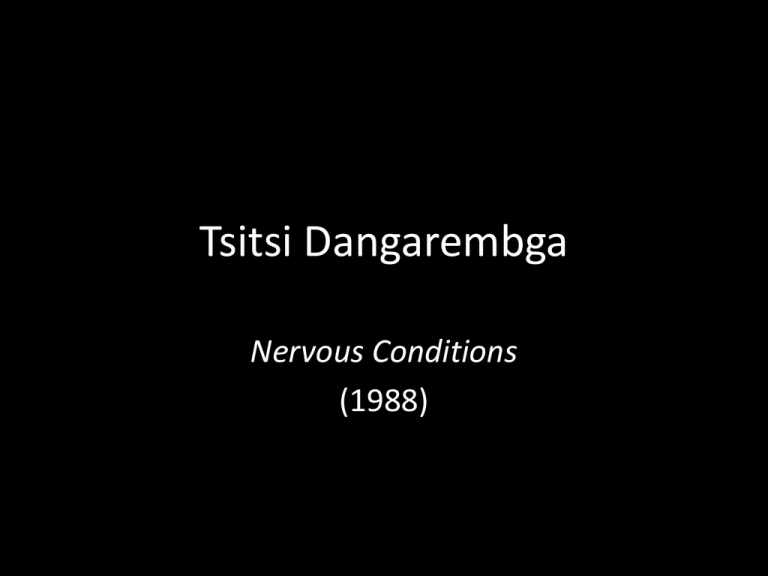
Tsitsi Dangarembga Nervous Conditions (1988) Setting • Set in Rhodesia (now Zimbabwe) in the 1960s • Rhodesia: a white settler colony (land appropriated from Africans in the late 19th c by Cecil Rhodes, the British politician, mining magnate and proponent of British colonialism) • A first person account of coming of age in colonial, white-ruled Rhodesia • Mutliple jeopardy of race, gender and class (“the poverty of blackness on one side and the weight of womanhood on the other” (mother to Tambu, p. 16) Portrait of colonialism • Cf. Fanon’s epigraph • Colonialism as epistemic violence—on language, culture, modes of being • Cf. Spivak Cultural and social effects of colonialism • Transformation of the village, traditional life under pressure from colonialism (top of p. 4) • Pre-existing social relations under pressure from new forces (pre-colonial not to be idealised) • Loss of language—Shona vs English (42), extended family vs nuclear • Culture as everyday acts and ways of being— clothes, eating, being (p. 48) Colonial education • Education: a double-edged sword—instrument for creating a docile, obedient class of colonised men; colonial education as a disciplining institution (p. 14) • P. 19: “They thought he was a good boy, cultivable, in the way that land is, to yield harvests that sustain the cultivator” • Education as alienation from family, labour, community—brother Nhamo’s distancing (pp. 6-7) • Education as aphasia “he had forgotten how to speak Shona” (52); “the more aphasic he became...the more my father convinced that he was being educated” (53) • Education as a male prerogative: “Nhamo would lift our branch of the family out of the squalor in which we were living” (4) • “in terms of cash my education was an investment, but then in terms of cattle, so was my conformity” (34) • Education as freedom Material effects of colonialism • Conditions of colonial labour • Changes in structure of family • Relationship to land Feminist Narrative • “I was not sorry when my brother died…my story is after all not about death but about my escape and Lucia’s; about my mother’s and Maiguru’s entrapment; and about Nyasha’s rebellion…whose rebellion may not in the end have been successful” (p. 1) • 3 models—escape, entrapment, rebliion • The novel invites us to evaluate each response Tambudzai as narrator • Ambitious, worldly, partial • Thinks of herself as wily, resourceful, wilful, headstrong “solid, utilitarian me” (40) • Her hero: Babamukuru: self-made man with power and money • Read top of p. 58 • Discourse of liberal feminism—individualised solutions to social problems; individual consciousness and agency vs the collective experience of gendered subordination • Liberal narrative of hard work • P. 58 first para • Brother has to be killed off; mother as obstacle Feminist consciousness • What is the source of her feminist consciousness? • “feeling the injustice of it” (12); “because you are a girl” (12)—against the naturalisation of roles • “these events coalesced formlessly in my mind to an incipient understanding of the burdens my mother had talked of…these were complex, dangerous thoughts that I was stirring up, not the kind you can ponder safely but the kind that become autonomous and malignant if you let them” (59) Nyasha • Nyasha’s transformation in England: no longer “bold, ebullient” (51) • “as though she were directing more and more of her energy inwards to commune with herself about issues that she alone had seen” (52) • Nyasha’s radicalism (p. 63, b) • A learned radicalism? The novel’s feminist discourse • Academically informed • Western and non-feminisms debated within the space of the novel Solidarity • Feminist solidarity cut through by colonialism and patriarchy • Strong bonds, that reproduce gender oppression • Mother: “ferocious swing of her arms” (7), hardworking, alone (Tambu’s solidarity with her p. 10) • Mother works hard to send Nhamo to school; to Tambu she tells “what will help you, my child, is to learn to carry your burdens with strength” (16)
